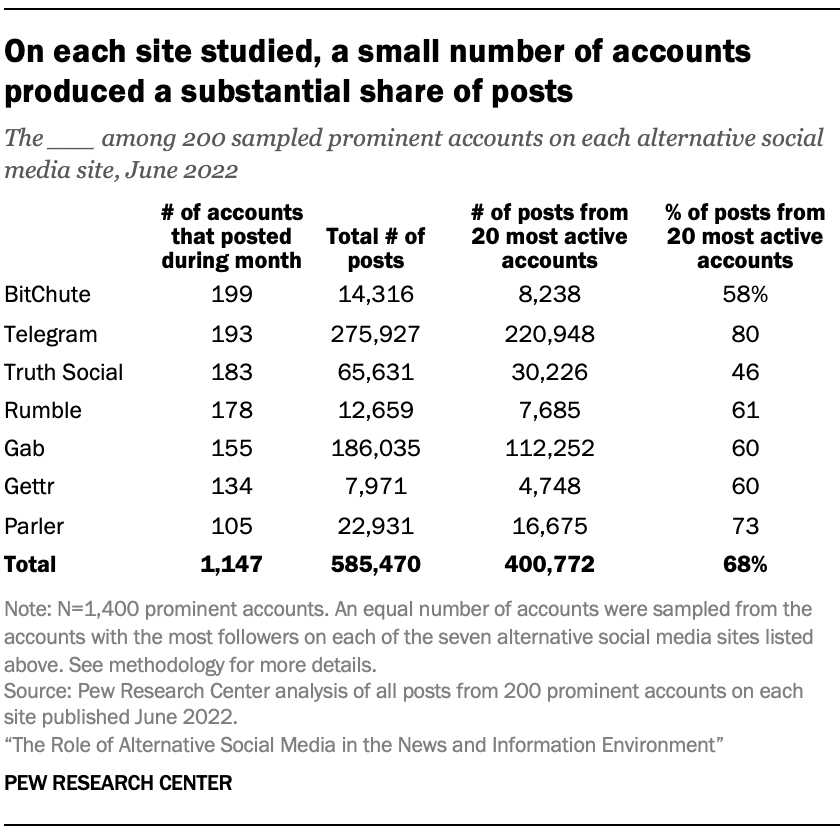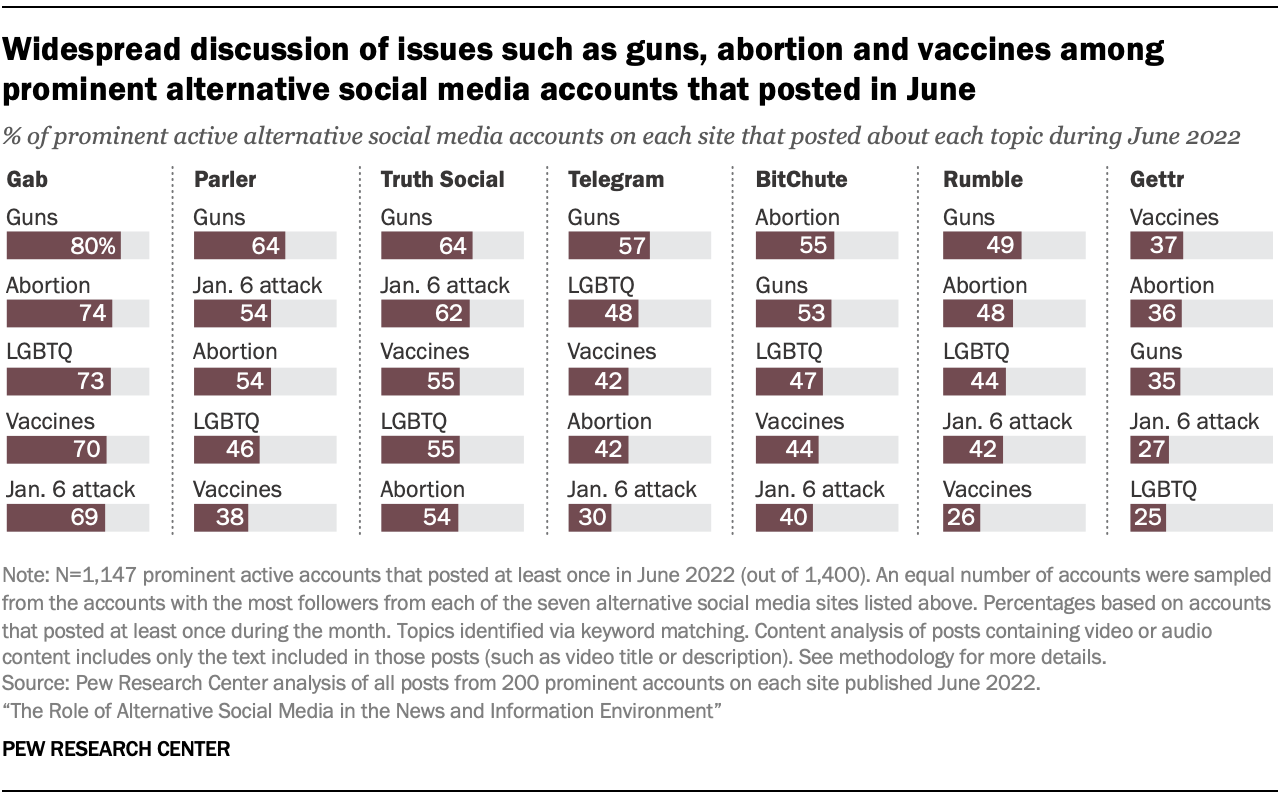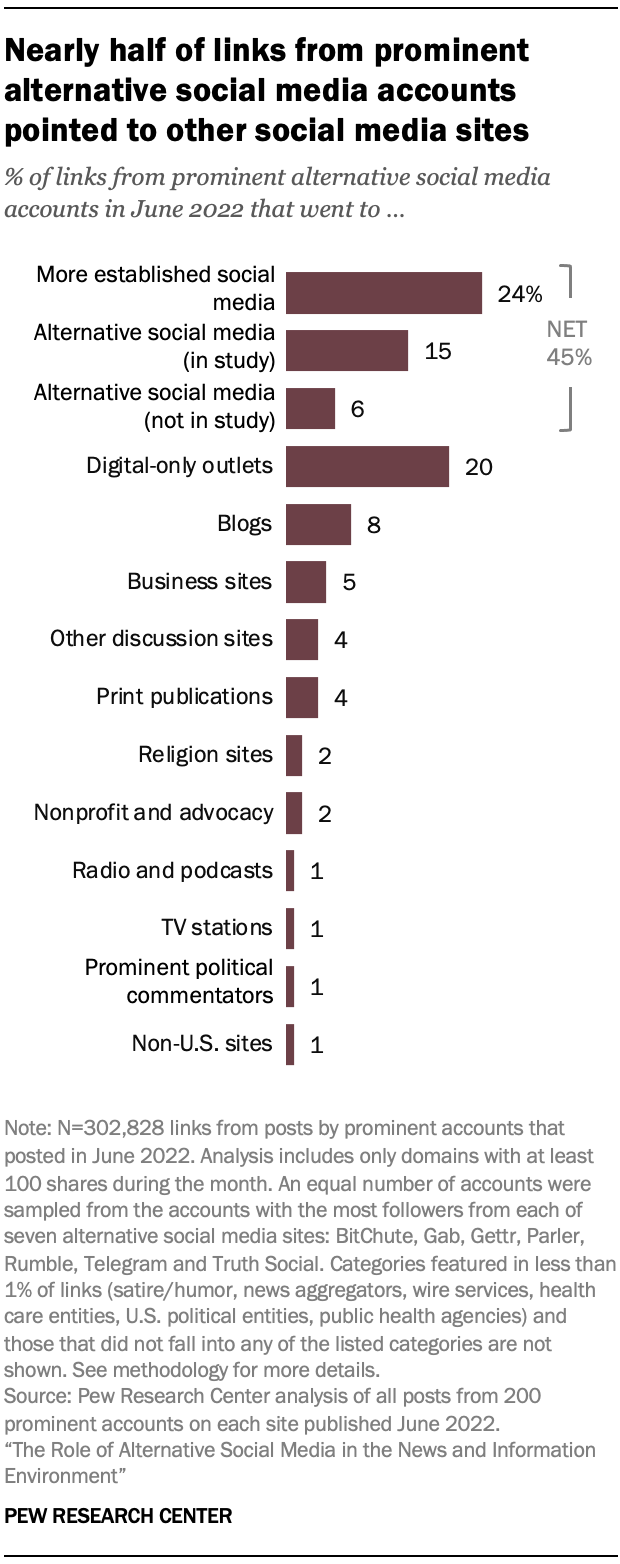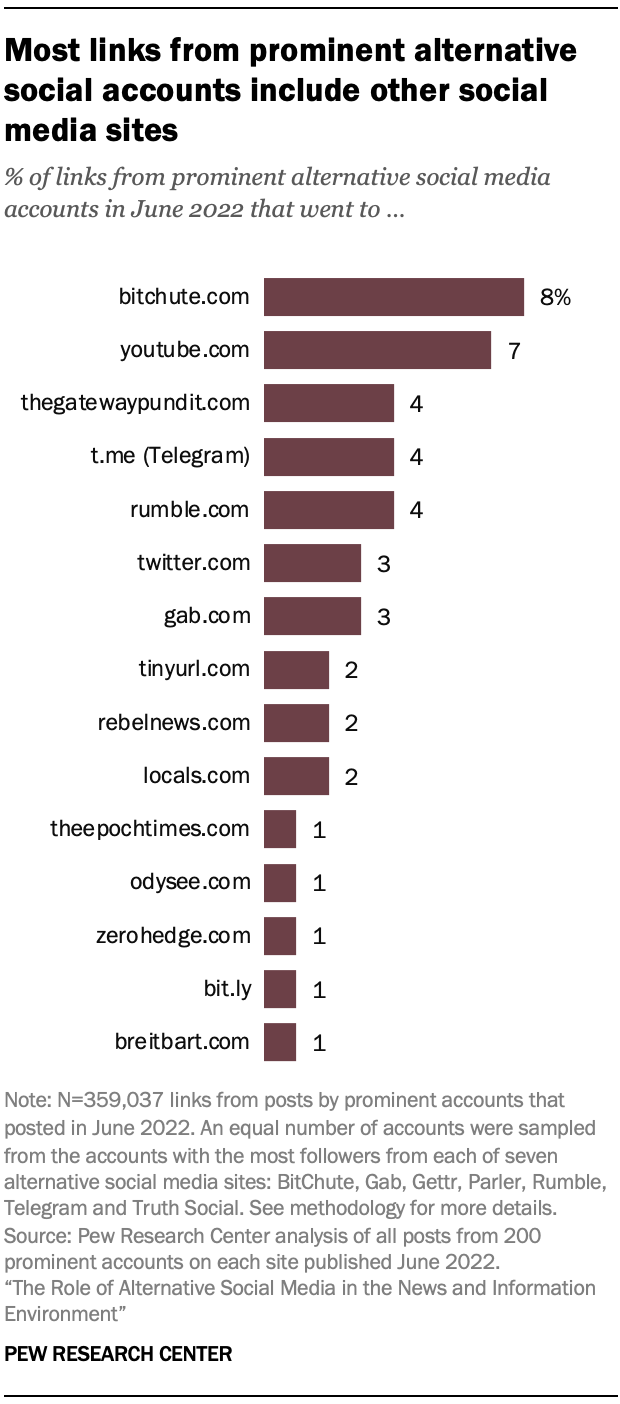Along with identifying samples of 200 accounts with the largest number of followers on each of seven alternative social media sites, Pew Research Center also collected all of the posts produced by these accounts from June 1 to 30, 2022. (For more details on how this data collection was conducted, see the methodology.)

These prominent accounts exhibited a number of differences in their basic posting behavior across sites – including whether they produced any posts at all during the month. At least 97% of prominent accounts on BitChute and Telegram were active in June. But on Parler, just 105 of the 200 prominent accounts identified published at least one post during the month.
These prominent accounts produced a sizable volume of content over the study period: a total of more than 585,000 posts across the seven sites. And the number of posts produced on each site varied in ways often tied to the structure and format of the platforms themselves. Prominent accounts on the chat-oriented site Telegram, for instance, produced by far the most individual posts – more than 275,000 in the month of June alone. Prominent users on video-focused sites like BitChute and Rumble, meanwhile, produced only about one-twentieth as many posts in the same time period.
Across all the sites, though, a minority of highly active users were responsible for a disproportionate share of the posts from these prominent accounts. The 20 most active prominent accounts on each site produced at least 46% – and as much as 80% – of all the posts the Center collected during the month of June. This sort of top-heavy posting behavior is a common feature of many online platforms that the Center has examined in its previous research.
Prominent accounts that posted during the month of June engaged in widespread discussion of topics like guns, abortion and vaccines
To examine the nature of the topical discussion among these prominent accounts, researchers used a keyword-based approach to identify posts mentioning five broad issues linked to contemporaneous news events or ongoing social developments. They then calculated the share of “active accounts” on each platform – those that posted something during the month – who mentioned each topic at least once.7
The topics examined were:
- Abortion (including the Supreme Court decision in Dobbs v. Jackson Women’s Health Organization that overturned Roe v. Wade)
- Guns, gun control and shootings
- LGBTQ issues
- The Jan. 6, 2021, attack on the U.S. Capitol (and related hearings)
- Vaccines
All five of these topics received considerable attention across the sites: Each topic was mentioned by at least a quarter of active prominent accounts on every site, and in many cases these topics were discussed by a majority of accounts.
While there were some site-level differences in the overall share of active accounts who engaged with these topics, the issue of guns and gun rights was an especially popular subject area among prominent accounts on nearly all of these sites. Of the topics examined, guns were discussed by the largest share of active accounts on five of these seven sites and by the second-largest share on another.
Discussion of the Jan. 6 attack, in contrast, exhibited more variation across platforms. The Jan. 6 attack was the least-discussed of these topics on three platforms (BitChute, Gab and Telegram), but was the second-most discussed – after guns and gun rights – on Parler and Truth Social. The Jan. 6 attack was mentioned by at least half of active prominent accounts during the month on Parler and Truth Social, as well as on Gab – where each of the five topics was discussed by two-thirds or more of active prominent accounts in June.
Discussion of LGBTQ issues was also common. A majority of active prominent accounts discussed this topic on both Gab and Truth Social, while more than four-in-ten such accounts mentioned it on Parler, Telegram, BitChute and Rumble. On only one platform (Gettr) was it the least mentioned of the five topics examined in the analysis.

Phrases used to discuss these topics highlight non-mainstream worldviews and sometimes offensive language
Note: This section of the report includes discussion of topics from posts on alternative social media sites, including verbatim quotes. Some of these phrases may be linked to misinformation or contain offensive content.
The words used by prominent alternative social media accounts to discuss issues such as vaccines or the Jan. 6 attack help reveal the unique language, issues of salience and influential figures within these online spaces. After identifying and measuring the prevalence of these topics at a broad level, researchers collected all the posts on each platform mentioning each topic. They then calculated the most common two- or three-word phrases (“bi-grams” or “tri-grams”) contained in these posts. (See the methodology for more details.)
Like many collections of unstructured discussion, the posts about any given topic contained a wide range of terms and phrasings. With some exceptions, the most common expressions within topics typically were mentioned in anywhere from 1% to 10% of all posts mentioning that topic. Even in these relatively small percentages, though, many common themes stand out. (See Appendix C for a full list of the top phrases within posts about each topic, as well as their prevalence.)
The Jan. 6 attack on the U.S. Capitol and related hearings: Discussion of real-time events mixed with contempt for the process
When these prominent accounts discussed the Jan. 6 attack, they often mentioned individuals (former President Donald Trump, House select committee member Rep. Liz Cheney) or entities (such as the Capitol Police and Secret Service) who were involved on the day of the attack or referenced in the congressional hearings happening at the time of the data collection.
In addition to discussing factual elements of the Jan. 6 attack and subsequent hearings, many common phrases used in these posts also demonstrate the extent to which the prominent accounts on these alternative social media sites disagreed vehemently with the fundamental legitimacy of the proceedings. The term “political prisoner” appeared in the 15 most-mentioned phrases in posts about these events on all seven alternative social media sites, while “unselect committee” and “witch hunt” each appeared among the most-used terms on four sites. Other common terms in these posts, depending on the site, included “DC gulag,” “sham hearing,” “deep state” and “kangaroo court.”
Vaccines: Frequent references to extreme vaccine skeptics and potential risks of vaccination
The most-mentioned phrases in vaccine-related posts from these prominent accounts suggest a deep skepticism about vaccines and the supposed risks of vaccination. The most common terms in these posts regularly mentioned generalized, unspecified risks like “side effect” and “adverse reaction,” as well as specific if rare conditions potentially caused by vaccines like “blood clot” and “heart inflammation.” They also included diseases or symptoms that the current medical literature finds little evidence of being linked to vaccines, such as “[sudden adult] death syndrome” or “sperm count.”
These common phrases also prominently featured the names of several influential vaccine deniers. The name of author and journalist Naomi Wolf – whose Twitter account was suspended in June 2021 for repeatedly posting misinformation about COVID-19 vaccines – was among the most mentioned vaccine-related terms on four of these seven sites. And discussions of vaccines on BitChute and Rumble often mentioned Stew Peters (a former bounty hunter-turned-radio host who has produced a documentary that associates COVID-19 vaccines with satanic forces), as well as conservative influencer Dr. Jane Ruby, who has promoted the false claim that COVID-19 vaccines are composed entirely of foreign substances, and that “there’s no other reason for this to be in here except to murder people.”
Other prevalent terms referenced conspiracy theories about the nefarious purposes of the COVID-19 vaccines (“Bill Gates”) or the source of the COVID-19 virus itself (“Wuhan coronavirus,” “CCP [Chinese Communist Party] virus”).
Abortion: Focus on law and policy after Dobbs ruling
More than the rest of these topics, discussion of abortion was dominated by a singular entity. “Supreme Court” was the most-mentioned phrase within these posts by a substantial margin, appearing in as many as 32% of abortion-related posts depending on the site – a reflection of the Supreme Court’s Dobbs v. Jackson Women’s Health Organization ruling that was leaked in early May 2022 before its June 24 release. Other common phrases in these posts across sites included “Planned Parenthood,” “[crisis] pregnancy centers,” and “killing babies.”
Gun control: Discussion of high-profile shootings and Supreme Court rulings, worries about new gun control efforts
Similarly, many common terms in posts mentioning guns referenced contemporaneous events like the May 24 school shooting in Uvalde, Texas (“Robb Elementary,” “police chief”) or the June 23 Supreme Court ruling striking down New York state’s concealed carry weapons law (“Supreme Court,” “New York,” “concealed carry”). Another common set of terms were related to concern and opposition to potential gun control regulations or restrictions. These included phrases like “take away [our guns],” “false flag” and “Matthew McConaughey” (who made several speeches and lobbying efforts on behalf of gun control efforts in the weeks following the Uvalde school shooting).
LGBTQ issues: Concerns over children and ‘drag queen story hour’
Posts from these prominent accounts mentioning LGBTQ issues covered a number of topics and concerns, but frequently focused on perceived threats or dangers to children. Some 10% of all posts mentioning LGBTQ issues across these seven platforms included words related to pedophilia (such as “pedo”) or child grooming (such as “groomer”). Other terms that appeared in these top phrases included “protect child,” “[number] year old,” and “child pornography.”
Another common issue of focus were so-called drag queen story hours: family-oriented events featuring drag performers, a number of which were the site of protests and occasionally violent confrontations in the spring and summer of 2022. The phrase “story hour” was among the 15 most-used phrases in posts mentioning this topic on six of these seven sites. And the phrase “Pizza Hut” – a reference to a viral controversy over a children’s reading club that included a book about a drag performer – was the single-most frequently mentioned phrase in these posts on Truth Social.
A third group of common phrases in these posts indicated concern over transgender issues and changing norms of gender identity. Roughly one-quarter of all such posts about LGBTQ issues by these prominent accounts (24%) included the word “trans.” And on four of the seven sites, the top 15 terms included references to transgender athletes competing in women’s sports.
These posts also frequently mentioned journalists, politicians and other figures who have prominently spoken out against changing gender norms, or against expanded rights and greater public acceptance for LGBTQ individuals.
These prominent accounts often linked to other social media platforms, established and alternative alike – but rarely to traditional media outlets

In the month of June, the prominent accounts examined in this analysis posted a total of 359,037 discrete links to 9,075 unique web domains. Around one-quarter of all posts produced by these accounts during the month (27%) included at least one link.
In an effort to understand the types of online entities these prominent accounts directed their audiences toward, researchers from the Center collected and classified every domain that was shared at least 100 times during the month. A total of 345 domains met this condition, and they accounted for 84% of all links shared by these accounts during the study period. These domains were then categorized in a method similar to the one used in the Center’s 2018 analysis of immigration-related tweets, as well as its 2020 examination of COVID-19 posts in public Facebook groups.
This analysis finds that social media sites – both established and alternative – are central to the link-sharing habits of these popular accounts. Fully 45% of all links to popular domains shared by these accounts went to some type of social media site, including around a quarter (24%) that pointed to more established sites such as YouTube or Twitter. Another 15% went to alternative social media sites that were included in this study – while 6% went to other alternative social media sites like odysee.com that were not included in this report.
Beyond social media, one-in-five of these links went to digital-only news organizations, while another 8% went to blogs. All told, nearly three-quarters of all links to popular domains from these accounts (73%) went to these four categories (more established social media, alternative social media, digital-only news and blogs).
By contrast, it was rare for these prominent accounts to link directly to legacy media sources. Just 4% of these links went to the online presences of print publications, and 1% went to TV station websites.
This abundance of links to the social web and digital-native news organizations – and paucity of links to legacy media sources – represents a stark divergence from the link-sharing habits in other online spaces the Center has examined. In the Center’s study of COVID-19 posts on public Facebook groups, more than four-in-ten posts containing links directed readers to either the website of a TV station (28%) or a print publication (15%). Meanwhile, just 9% of such posts contained links to other social media sites. And in the Center’s study of immigration posts on Twitter, legacy news organizations such as print, TV and radio accounted for 28% of linked sites – double the share for digital-only news organizations (14%). Even acknowledging the differences in these studies – including the methods, time frame and topical orientation – the stark variation in these findings is striking.
Social media sites and digital-only publishers are the most common individual domains in links from prominent alternative social media accounts

In addition to grouping these domains into categories, researchers also examined the most popular individual domains based on the share of all links that directed readers or viewers to those sites. (For the top domains across each individual alternative social platform, see Appendix C.)
Three digital-only publishers – The Gateway Pundit, Rebel News and Breitbart – appeared in the 15 most-linked domains across the seven platforms. Indeed, 8% of all the links shared by these prominent accounts over the month of June went to these three platforms – with 4% of all links going to The Gateway Pundit alone. The rest of the domains in the top 15 consisted primarily of social media sites, whether established or alternative.
And the 15 most-linked domains contained only one outlet that began as a print publication: The Epoch Times.


